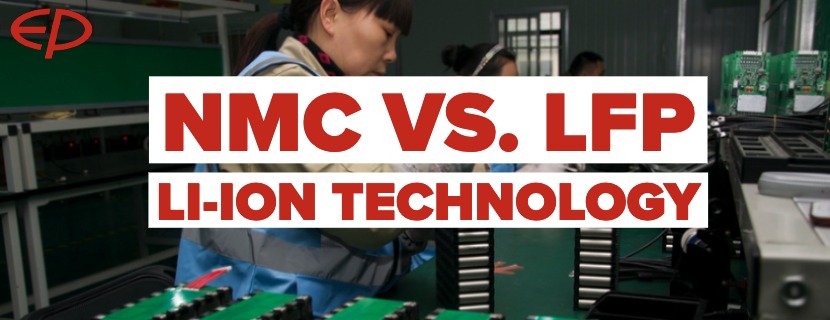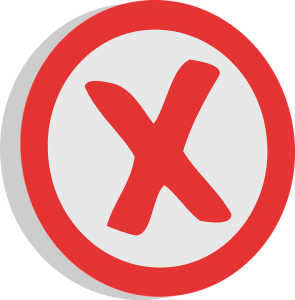If you’re considering a forklift for your workplace, or you’re looking to upgrade your existing equipment, then you’ve likely already discussed the pros and cons of the type of forklift you need. After you have decided on the type of equipment you need, it is time to have a closer look at the battery types. With the growing trend towards Li-Ion Batteries, we want to give you some insight into the different kinds of technology offered by different suppliers.
Two main types of lithium-ion battery for electric forklifts exist: the NMC battery and the LFP battery. Confused about which is the right fit for you, and what the differences are between the two power sources? Read on to find out more about what each battery means when it comes to your choice of forklift, and whether they’re the right fit for you:
What is an LFP battery?
The more traditional and well-known type of lithium-ion battery, the lithium iron phosphate battery is on the market since the late 90s and well-integrated with many electric-powered tools, machinery and vehicles.
As such, the battery is effective as a power source for forklifts and other machinery. LFP batteries are reliable, consistent and have longer battery life. They revolutionised electricity use and are still effective today. This is in part thanks to their universal design, lower cost and practical development that makes them usable for countless different situations and machines.
What are the advantages of LFP batteries?
As the most commonly used and well-tested batteries on the market, there are many advantages to choosing an LFP-powered machine or vehicle. Especially when using larger equipment like an electric ride on pallet truck or electric forklift trucks, the LFP battery plays out its strength.
LFP batteries are not a huge issue for larger trucks because their lower energy density doesn’t matter much. Instead, the benefits can still be used.
LFP is a very stable and robust cell type with a very limited possibility of thermal runaway. Even when punctures through the cell, the LFP battery does not catch fire and burn. It would only produce smoke!
The second advantage comes with the cost of the battery. While other technologies are still in the development phase, LFP is well tested and produced in large quantities. Due to the high production volume, the cost of the battery is lower while offering you all the advantages of Li-Ion technology like fast charging, high energy output and maintenance free life.
LFP batteries are both functional and reliable. This is in part thanks to the rigorous testing and design changes they have undergone over their years in use that have led to simple versions available today.
What are the downsides of LFP batteries?
The main disadvantage of lithium iron phosphate lfp batteries is the lower amount of power that can be stored within a battery cell. LFP batteries are not suitable for devices that require maximum power in a small and lightweight package.
One example of this application would be the automotive industry, where a high amount of power must be stored in a very limited space and weight plays a key role. Those types of machines need a high density of power in limited space and LFP would not be a perfect choice.
What is an NMC battery?
Also known as lithium-manganese-cobalt-oxide batteries, an NMC battery is a newer type of power source in comparison to other common types of lithium-ion batteries. Originating in 2009, the NMC battery has been growing in popularity for use in power tools and other small machines that utilise battery power. This is thanks, in part, to its energy density and overall capacity.
For car manufacturers and other machinery, NMC batteries are becoming increasingly commonplace thanks to these benefits, offering the batteries to an increasing portion of the market. Depending on the application it is also available in warehouse trucks.
 The advantages of NMC batteries
The advantages of NMC batteries
There are many reasons why manufacturers may consider changing to NMC batteries for their products. These advantages are also pluses for the end user of the product, whether it’s a power tool or small warehouse equipment.
The primary advantage of NMC batteries is their high energy density, allowing machines to be more compact and light. Especially when developing light and small pallet trucks for usage in transport logistics, NMC plays out its strength for the material handling industry.
As a newer form of battery, NMC batteries are also consistently evolving and developing to be smaller and more effective, something older forms of lithium-ion batteries have already achieved.
 What are the disadvantages of NMC batteries?
What are the disadvantages of NMC batteries?
While NMC has its advantages in the density of power it can store, this also comes with disadvantages. While NMC is a good choice for small material handling equipment like pallet trucks or stackers where space is limited, it is not the optimal choice when it comes to big batteries where space is not the main issue!
When punctured, the NMC cell is more likely to get into an unstable state. Anyhow, this risk is very limited in the material handling industry, as the batteries are much more protected by steel compartments and protection around the battery compared to other products like hoover boards or cars.
Another issue with NMC batteries is the costly nature of the batteries. While they do have a higher energy density, the cost of machines utilising these batteries is increased as a result, making them a less viable choice in many situations.
 NMC vs. LFP – which is the better choice for the material handling industry?
NMC vs. LFP – which is the better choice for the material handling industry?
Now you know more about the functions, pros, and cons of different battery types. As you can see from the overview, both technologies come with advantages and disadvantages.
LFP in a nutshell
LFP technology plays out it strength at bigger equipment where density of power is not the key to run around the clock. The LFP battery is the most common and readily available source of power out there. It has been used for electric forklifts for years and have proven themselves to be a reliable, effective way to power machinery. This is especially true for forklifts, ride on pallet trucks and higher capacity pallet trucks like the WPL 202.
LFP battery-powered forklifts are cost-effective and convenient. They can be used for shift work without the need for frequent charging breaks. You can create a power bank for your forklift, ensuring it is always ready to use when required. This makes the LFP battery the workhorse of the power world, consistently getting the work done on time.
NMC in a nutshell
For those considering NMC batteries, the technology is undoubtedly shaping up to be impressive; offering an alternative power source for anything from solar panels to high-powered vehicles.
The higher cost per cell for NMC technology does play a large role in its slower introduction to the forklift truck market. Especially with large batteries like the 80V 540Ah Lithium-Ion battery in the L1 four-wheel forklift truck the LFP technology gives a better price-performance ratio compared to the more expensive NMC cell.
EP shaping the future of Li-Ion technology
At EP we will keep on developing new machines that fit perfectly every specific application. EP selects the most suitable technology for each product to guarantee excellent performance, safety, and reliability. This also ensures the best value for money for the end-user.
As the largest manufacturer of Li-Ion powered pallet trucks, EP Equipment offers a wide range of trucks, based on both NMC and LFP technology and is constantly developing new trucks based on the latest technology.
Still some questions?
Still unsure about Li-Ion technology and what product fits best to your need? At EP, we have a full range of LFP-powered forklifts designed to meet your exact specifications, needs and requirements.
Li-Ion technology is the latest trend in material handling and EP Equipment is the forerunner for this technology with a long history of producing Li-Ion forklift trucks and warehouse equipment.
See the full range of EP products, including electric forklifts, order pickers and stackers online today, or contact us to find out more about what we can do to help you find the forklift that’s right for you.




 NMC vs. LFP – which is the better choice for the material handling industry?
NMC vs. LFP – which is the better choice for the material handling industry?